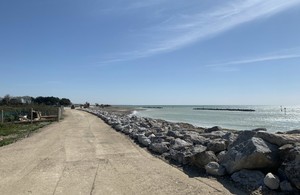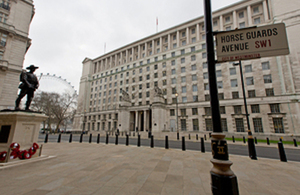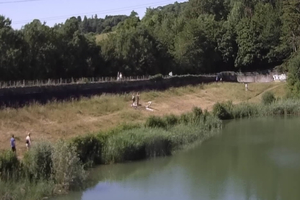Elmer coastal defences now complete
Press release
Elmer scheme will better protect 325 West Sussex properties from flooding.

Elmer flood scheme seen from the coastal path
The Environment Agency in partnership with Arun District Council and Elmer Sands Limited has completed major coastal defence works at Elmer in West Sussex.
This new flood scheme will better protect 325 properties from flooding. It has cost £5 million and a further £3 million will be spent on maintenance over the next 50 years. Funding for the scheme is from the UK Government, Arun District Council and Elmer Sands Ltd.
During construction 20,000 tonnes of rock were used to improve the existing rock revetment and 12,500 cubic metres of shingle were recharged across the defences. A new boat ramp for Elmer Boat Club was also constructed.
To mark the occasion the Environment Agency hosted a virtual opening ceremony on Monday 22 June using Microsoft Teams.
Emma Howard Boyd, Chair of the Environment Agency, said:
While the coronavirus has changed so much this year, flooding and coastal erosion have not gone away. Throughout the recent lockdown, the Environment Agency continued working on flood schemes while following government guidance and safe working measures. This new £5 million flood scheme will better protect 325 properties in Elmer, and is an example of how we work with partners to make communities more resilient to the escalating impacts of the climate emergency.
John O’Flynn, Environment Agency Operations Manager, said:
We realise the inconvenience that this work may have caused our local neighbours, especially during this lock-down period. We would like to thank them for their co-operation and the understanding throughout the work.
In carrying out this critical construction during the coronavirus outbreak, our contractors followed guidance from Public Health England to work safely on construction sites. The safety of our staff, partners and the communities we work is always our priority.
Published 23 June 2020


